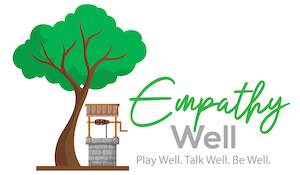EmpathyWell provides the developmentally appropriate and evidence-based approach of play therapy for children. Specifically, EmpathyWell provides the evidence-based approaches of Child-Centered Play Therapy and Adlerian Play Therapy.
Child-Centered Play Therapy (CCPT)
 Child-Centered Play Therapy (CCPT) is a developmentally responsive, play-based mental health intervention for young children ages 3 to 10 who are experiencing social, emotional, behavioral and relational disorders. CCPT utilizes play, the natural language of children, and therapeutic relationship to provide a safe, consistent therapeutic environment in which a child can experience full acceptance, empathy, and understanding from the counselor and process inner experiences and feelings through play and symbols. In CCPT, a child’s experience within the counseling relationship is the factor that is most healing and meaningful in creating lasting, positive change. Based on person-centered principles, the overarching goal of CCPT is to unleash the child’s potential to move toward integration and self-enhancing ways of being. Child outcomes following CCPT include decreased symptomatic behaviors and improvement in overall functioning.
Child-Centered Play Therapy (CCPT) is a developmentally responsive, play-based mental health intervention for young children ages 3 to 10 who are experiencing social, emotional, behavioral and relational disorders. CCPT utilizes play, the natural language of children, and therapeutic relationship to provide a safe, consistent therapeutic environment in which a child can experience full acceptance, empathy, and understanding from the counselor and process inner experiences and feelings through play and symbols. In CCPT, a child’s experience within the counseling relationship is the factor that is most healing and meaningful in creating lasting, positive change. Based on person-centered principles, the overarching goal of CCPT is to unleash the child’s potential to move toward integration and self-enhancing ways of being. Child outcomes following CCPT include decreased symptomatic behaviors and improvement in overall functioning.
Adlerian Play Therapy (AdPT)
Adlerian Play Therapy, based on principles from individual psychology (also known as Adlerian theory), is a developmentally responsive, play-based mental health intervention for children ages 3 to 10 who are experiencing social, emotional, behavioral, and relationship concerns. Using play and carefully selected materials, Adlerian play therapists build a collaborative, trusting therapeutic relationship with clients to provide them with the encouragement they need to gain self-understanding and explore more adaptive ways of feeling, thinking, and behaving within their environment. In AdPT, the approach utilizes both directive and non-directive ways of working with children to support them wherever they are in their therapeutic process. This means that the Adlerian play therapist will provide space for both child-led and counselor-led activities throughout services to help the child make progress in self-concept, sense of connectedness to others, and overall sense of empowerment. The overarching goal of AdPT is to support the child’s shift in beliefs about themselves, others, and the world to help them feel more successful personally and in relationships with others. Outcomes following AdPT include decreased symptomatic behaviors and improvement in overall functioning.
Although these approaches differ in theoretical foundation and specific therapeutic goals, all EmpathyWell counselors have the same overall goal for children: help them achieve their full potential and feel happy and confident navigating the world.
Frequently Asked Questions
Please see our Play Therapy FAQ to learn more about play therapy and how it may be beneficial for your child.
